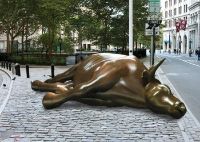General Discussion
Related: Editorials & Other Articles, Issue Forums, Alliance Forums, Region ForumsIn his final act, Hugo Chávez managed to stick it global corporations
By Tim Fernholz
The late Hugo Chávez would surely have been pleased to know that one of his last acts as Venezuela’s president is now hitting multinational corporations where it hurts—in the bottom line.
With this week’s (contested) election of Nicolás Maduro, Chávez’s chosen successor, to the presidency, prospects for the country’s economy are a bit bleak—and so are those for the big multinationals that sell its citizens food, soda, deodorant, make-up and booze.
Maduro has pledged to continue Chávez’s economic policies, which have depended on the value of the country’s oil exports and nationalization of key industries. But the country suffers from big budget deficits, has high inflation despite a regime of price controls, and is disproportionately reliant on imports for many consumer goods.
In February, from his sickbed, Chávez—assuming you are not one of those conspiracy theorists who think he was already dead by then—devalued the currency by nearly a third. Making the bolivar cheaper means the government makes more money from oil sales abroad, and also makes imported goods more expensive, giving domestic companies an advantage.
That was a problem for multinationals. Not only did it make their products pricier overnight, but any Venezuelan assets and cash their local subsidiaries held instantly lost value. This week, we got a picture of that as Coca-Cola, Pepsi and Johnson & Johnson announced their earnings. This morning, Pepsi reported $111 million write-down on its assets as a result of the currency adjustment. On a net income of $1.1 billion, that’s a fairly significant hit. On Tuesday, Johnson & Johnson reported losing $100 million, which reduced earnings per share by $0.04, and Coca-Cola wrote off $149 million.
That should lead us to expect similar write-offs from Unilever, Colgate-Palmolive, and Procter and Gamble, three major global consumer-goods makers with Venezuelan exposures, when they announce their first quarter earnings next week.
more
http://qz.com/76059/in-his-final-act-hugo-chavez-managed-to-stick-it-global-corporations/
Dreamer Tatum
(10,926 posts)Tarheel_Dem
(31,232 posts)Chavez's heir will be the fallguy, when it all comes crashing down . Maduro won't serve a six year term. I heard on NPR this morning the country's having increasing difficulty getting the basics of daily living (e.g., food, medicine, etc), and inflation is at 30%. That's not sustainable.
An Economic Crisis of Historic Proportions
Moisés Naím, a scholar at the Carnegie Endowment for International Peace, is a syndicated columnist and author......
......explained that unless the government supplies more dollars to pay for imports, shortages -- from food to medicine -- would be inevitable. "What we will give Fedecámaras is not more dollars but more headaches," replied acting president Nicolas Maduro, the heir apparent to the Chavista regime (and Hugo Chávez's vice president).
Maduro is correct. Crushing headaches will soon be inevitable across the country, including within the private sector but especially among the poor. President Chávez has bequeathed the nation an economic crisis of historic proportions. Venezuela is consuming more than it is producing. This is due to enormous government spending, mounting foreign debt and the mismanagement of its oil industry.
The crisis includes a fiscal deficit approaching 20 percent of the economy (in the cliff-panicking United States it is 7 percent), a black market where a U.S. dollar costs four times more than the government-determined exchange rate, one of the world's highest inflation rates, a swollen number of public sector jobs, debt 10 times larger than it was in 2003, a fragile banking system and the free fall of the state-controlled oil industry, the country's main source of revenue.
Oil-exporting countries rarely face hard currency shortages, but the Chávez regime may be the exception. Mismanagement and lack of investment have decreased oil production. Meanwhile oil revenue is compromised partly because of Chávez’s decision to supply Venezuelans with the country's most valuable resource at heavily subsidized prices. Thus a large and growing share of locally produced oil is sold domestically at the lowest prices in the world (in Venezuela it costs 25 cents to fill the tank of a mid-sized car).
http://www.nytimes.com/roomfordebate/2013/01/03/venezuela-post-chavez/chavez-will-leave-behind-an-economic-crisis
Egalitarian Thug
(12,448 posts)Damn, but those "capitalists" are a sensitive bunch.
Zorra
(27,670 posts)
Well done, Don Hugo! Hasta la victoria siempre!
ieoeja
(9,748 posts)Because that, not where Venezuela sets it, is where the loss & profits get calculated. I know that my employer was doing more business in Venezuela than in any other South American country, but not making much profit because of the dropping Bolivar.
And most of the Bolivar drop is due to one thing: the United States currently labels Venezuela as an enemy. If the US gov't views you as an enemy, people don't have much faith in the value of your money.
And price controls is rarely a good response to inflation. Nixon used price controls which was probably the #1 cause of double-digit inflation for most of the 70s. OPEC made it worse, but there was a lot of steady pressure from previously artificial low prices.
hack89
(39,171 posts)Devaluation reduces the deficit by increasing the revenue from oil imports.
Venezuela has devalued the Bolivar five times in nine years.